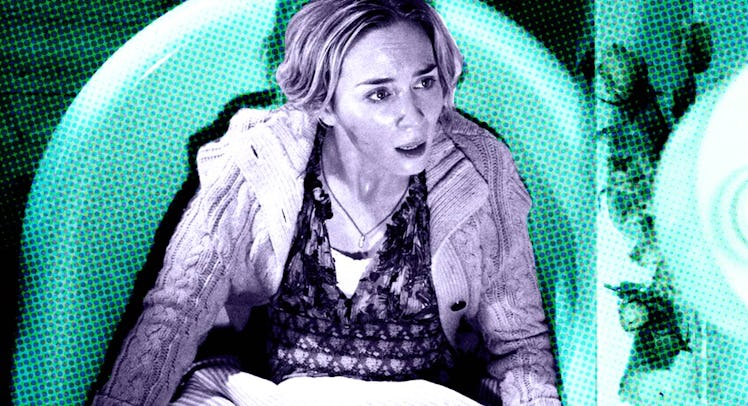Why Are All These Idiots in Movies Having Post-Apocalyptic Babies?
Bringing a child into a post-apocalyptic nightmare puts everyone in even more danger.

In A Quiet Place, John Krasinski’s tripwire-tense new horror thriller, a family tries to eek out an existence in a world where nearly any sound spells death. It’s a tense, surprisingly heartfelt exploration of mourning and parenting. It also features two of the most irresponsible parents in recent movie history.
[Spoilers Below]
Blind creatures with super-receptive hearing have taken over the world (Are they aliens? Mutants? It’s never explained). Once they pick up a sound, these “dark angels,” as some newspaper clippings have dubbed them, quickly sprint towards, slash at, and feast upon the thing that made the sound with terrifying ferocity. Krasinski and his actual wife Emily Blunt play married couple Lee and Evelyn Abbott who, with their kids Regan, Marcus, and Beau, live on a farm in upstate New York. The couple has gone to great lengths to literally insulate their world from these sleek terrors, constructing a wide-array of fail-safes to not only mute their existence but also maintain some sense of normalcy for their kids.
Of course, the world they inhabit is a harsh one. And Beau, their youngest, gets killed by one of these creatures in the opening sequence of the movie. We then flash forward over a year, into day 472 of the apocalypse. Time has passed since Beau’s shockingly quick death, but the loss still looms large — and it shows. Regan, the eldest daughter who is deaf, feels like she is to blame for what happened (she gave Beau the electronic spaceship that drew the creatures to him); Marcus is terrified of the creatures and barely wants to participate in anything that might lure the creatures. Evelyn and Lee are more world-weary and protective of their children. They are in love and trying to do their best. But you see it on their faces and in their movements — this bleak, silent world where death is so ever-present is no place for a family
Which is why it’s all the more preposterous that Evelyn and Lee are expecting their fourth child. The baby-to-be would be entering a world where, not only would it be an instant target (a baby’s natural defense, of course, is to make sound) but also that has no real sign of improving: The movie makes it clear that no one has any idea how to defeat the creatures, nor even drive them away. Why would they do it?
It’s a decision that they aren’t alone in making; throughout the history of post-apocalyptic fiction, there has always been pregnancy. The promise of a new life bringing new hope is a genre trope at this point and it is almost always irresponsible.
In The Walking Dead Lori Grimes gets pregnant and gives birth in an unforgiving world overrun with zombies. Then she dies shortly after childbirth and isn’t even around to protect it. What grim future awaits something that can’t even run away? In Children of Men, the world’s first pregnant woman in a generation is seen as a beacon of hope, except for the fact that she’s bringing the first child in 18 years into a world that is slowly crumbling from extinction anxiety. What’s the little girl going to be? Some sort of brood sow to help populate the entirety of earth?
It is a terrible choice to bring a kid into a world that isn’t just depleted but actively hostile. And the specifics of A Quiet Place make such a pregnancy even more problematic. (Bringing new life into the world requires noise, after all.) Yes, the Abbotts have gone through many precautions – including constructing a soundproof room and a very clever oxygen filled crib in which the baby can yowl until its little lungs’ content. But since when do things, especially things like childbirth, go according to plan?
The movie’s best scene – wherein Evelyn has to deal with contractions and birth silently, lest the creature find her – is also its most confounding. Did the Abbotts expect that she would be able to scream her heart out in that little soundproof room they created?
Of course, this could be their way of coping with the loss of their youngest son. This helps bring on an explanation: the Abbotts just didn’t think about it until after. The movie goes to great lengths to show that they love each other, and even in a grim world where words will get you killed, the need for human connection and intimacy remains. Sure, they could have looted condoms from the grocery stores and pharmacies of the empty new world, or done any number of other things to prevent new life from springing up. But they decided against it.
Are they that different from us? The elephant in the room is that people in real world 2018 are having similar arguments with themselves: Is it ethical to bring kids into a world that is facing the potential disasters of climate change, food shortages, and nuclear war? A 2014 Scientific American article came to the conclusion that we will pass the so-called “Climate Danger Threshold” by 2036, when kids born in 2018 will just be reaching college. Is it selfish to ignore the studies that conclude that fewer births might be better for the earth? Possibly.
Then again, in reality, there are so many decisions that compel couples to have a family. Climate change is a less immediately insidious threat than the “dark angels” of A Quiet Place, so it’s harder to fault parents for their choices than it is to blame them for the eventual endangerment that comes from the decision to get intimate in the apocalypse. The answer, it seems, is this: Like many parents in fiction of days past, the Abbotts are thinking with their hearts and not their heads. Is there anything more human than making a baby from that decision?